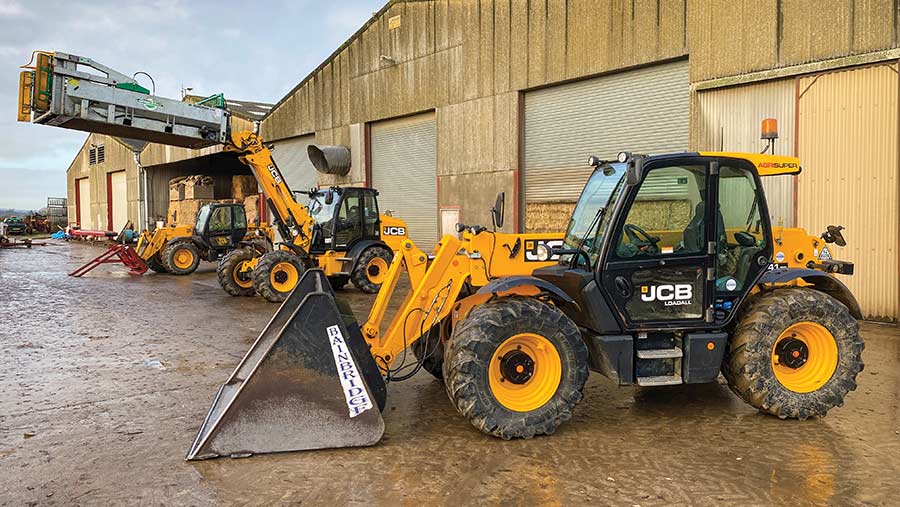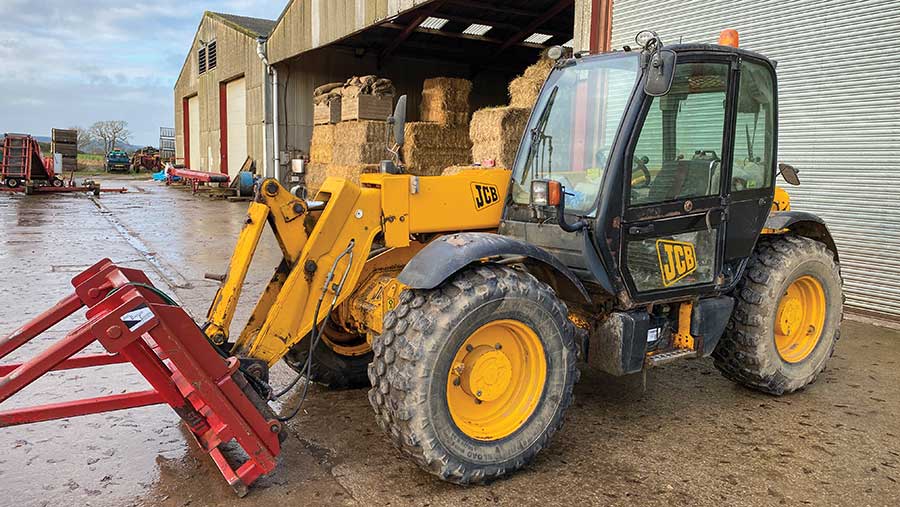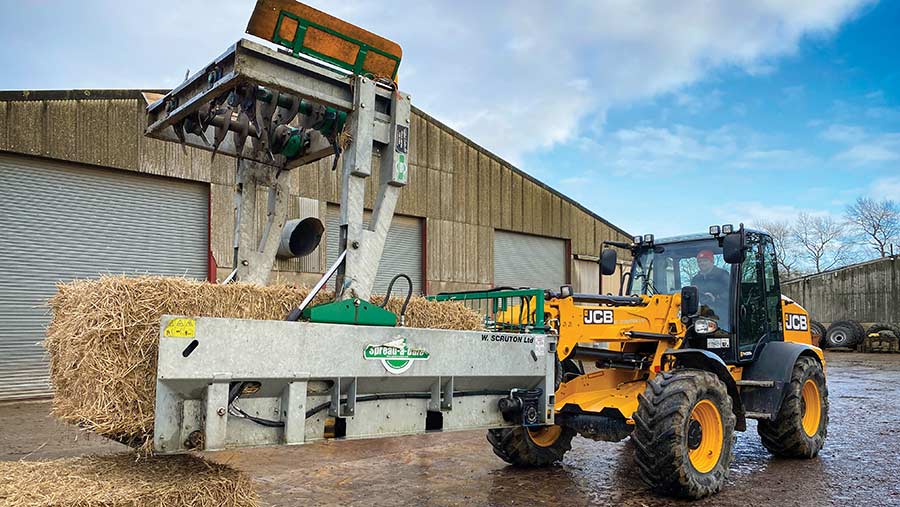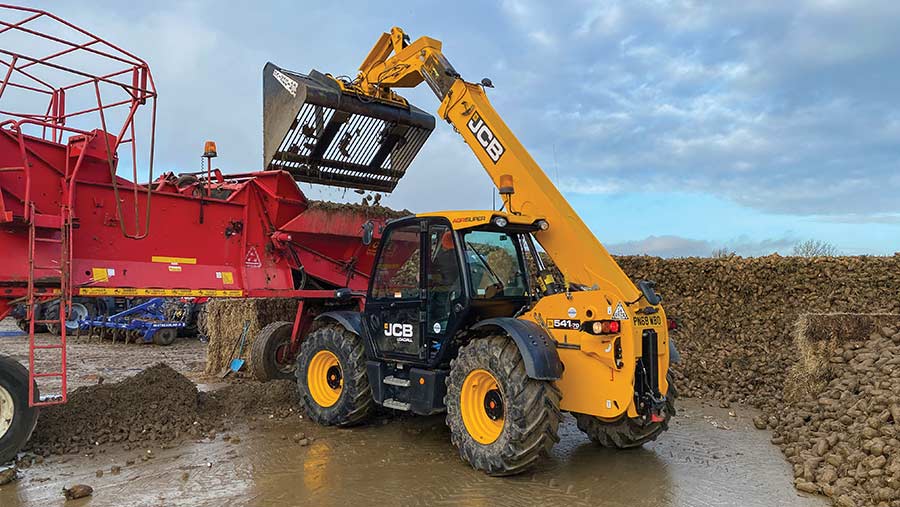Telehandlers old and new: Yorks farmer’s replacement policy
 © MAG/Oliver Mark
© MAG/Oliver Mark Old and new telehandlers, separated by 19 years and 10,000 hours, make up the three-strong JCB fleet run by Yorkshire farmer Andrew Wilson.
As their workloads vary, he has gradually devised a strategy for replacing them that helps extract maximum value without jeopardising reliability or obliterating their second-hand worth.
Cumulatively, they clock 2,000 hours annually, loading sugar beet, shifting grain, loading potatoes and bedding 1,200 pigs.
See also: Farm swaps new tractors for a fleet of Deutz Agrotrons
“My over-arching policy is to make them last. I try and deal with the small niggles immediately, which both stops them becoming bigger problems and avoids them accumulating into extensive downtime and one monster bill.”
“We don’t change machines purely for shinier paint, either. But there’s a fine line – replacements need to be sustainable, but they’re also essential.
“Hanging on too long will eat away at residual value, the kit will get unreliable, and it becomes very difficult to then upgrade.”
With that in mind, Andrew has a defined – albeit relatively loose – policy for each telehandler, driven largely by the cost, availability and quality of second-hand options.
This applies most pertinently to his two newest machines – a TM320S pivot-steer and a 541-70 Loadall, both of which do up to 800 hours/year.
“To some owners, the TM is a poor man’s loading shovel, and many have been caned loading spreaders and climbing clamps, so there’s a dearth of used models in anything near decent condition.
“For that reason, I will buy a brand-new one every 10,000 hours or so, before the value drops off a cliff at about 12,000 hours.”
Conversely, his four-wheel-steer machine, currently a 541-70, tends to be bought a couple of years old with up to 2,000 hours on the clock.
“As it’s predominantly an arable machine, there’s no shortage of tidy second-hand options.
“This means I can let someone else take the sting out of the depreciation, run it to about 7,000 hours, then look for a like-for-like replacement.”
The third member of the fleet is a long-serving, 2001-built 530-70 Agri Super that has now passed 12,000 hours.
It had an engine rebuild three years ago and is likely to see out the rest of its days at Brickyard Farm.
JCB 530-70 Super Loadall
The Slingsby-based business ran a Massey Ferguson 135 with Mill Master front-end loader alongside a Sanderson SB55TC (torque convertor) forklift until its first telehandler, a Matbro Teleram, arrived in 1991.

© MAG/Oliver Mark
Following a few good farming years in the mid-90s, the Teleram was upgraded to a Matbro TR250 and a Quicke Q980 loader was fitted to an existing Case IH Maxxum 5130 Synchro – primarily for sugar beet.
But when the latter chewed up its crown wheel and pinion in 2003, the first of the current fleet arrived – a JCB 530-70 Super.
This was the family’s first four-wheel-steer machine, having been purchased for £27,000 when it was two years old and on 1,700 hours.
Its “Super” spec includes a turbocharger, upping output of the Perkins engine by 20hp over the standard model, a five-speed powershift rated to 40kph, air conditioning and boom suspension.
Somewhat predictability, it’s seen a few spanners during its 12,020-hour tenure.
Among the components replaced are four exhausts, two water pumps, an alternator, three thermostat housings, and two seats.
It became reluctant to fire up in cold weather some years ago and, after growing tired of regularly jumping it off the cleaner loader on chilly mornings at the beet heap, Andrew decided to fit a gear reduction starter motor, which solved the problem.
Other items to have suffered from wear include the seat cushion (2,000 hours), handbrake shoes (6,000 hours), brakes (10,000 hours) and a handful of pins and bushes.
The black cab paint also peeled off long ago and has since been touched up; the yellow stuff is still going strong.
The boom occasionally fails to lift, too. But the repair simply involves replacing two split pins in the mechanical linkage between the joystick and spool block, such is the simple design of the machine.
The machine almost got the chop in 2019 when Andrew wound down the seven-wagon haulage business. But, given its all-round usefulness, it ended up getting a stay of execution and, as it turned out, a new lease of life.
“It’s too old for front-line service, but it has well and truly paid for itself and is a cheap back-up. As it was getting hot in the field and breathing badly, I decided to get the engine overhauled.”
Local mechanic Ben Smith replaced the piston rings and cylinder liners, turbo, and oil pump, and refurbished the cylinder head, which transformed performance.
“It’s difficult to put a price on the convenience factor of having a third machine, and it still does about 250 hours a year.
“It might not be as comfortable or quick as the new ones, but it can do everything – load the seed drill or fertiliser spreader, feed the potato washer and stack bales– without us having to pull one of the others away from their work.”
“The only thing it won’t do is run the Spread-a-Bale spreader. It simply can’t pump enough oil for that.”
Specs
JCB 530-70 Super Loadall
- Year 2001
- Engine 4-litre, four-cylinder turbo Perkins Phaser
- Power 120hp
- Transmission Five-speed powershift
- Lift capacity 3t, 7m
- Price paid £27,000 (two years old, in 2003)
- Annual hours 250
- Total hours 12,020
- Replacement policy Lifer
JCB TM320S
In 2005, the farm’s 1986 Matbro Teleram was replaced by a new JCB TM300 (£48,000) that wiped the floor with its competition during a series of demos.

© MAG/Oliver Mark
It proved a roaring success, but for a couple of minor engine-related issues, and stayed for 15 years and 11,880 hours of hard labour.
The 4.4-litre block was first hoicked out for a ring gear replacement, then again to sort an oil leak due to the camshaft moving out of line, which was letting oil into the bell housing.
Neither issue was terminal, but it was getting tired, needed new tyres – the first set managed an impressive 5,500 hours – and, given a likely increase in its workload, it made more sense to replace it rather than spend more money on it.
“Slow tyre wear is one of the many reasons I like the TMs, but it made no sense to fit new ones on a £15,000 machine that had already been worked hard.
“They would have cost about £600/corner, and I would probably have got only half of that back if I’d then decided to sell it – which was highly likely given its age.
In its place, in August 2020, came a brand-new TM320S. Like the TM300, it is a long-term investment.
“I had little choice but to buy new because there are so few second-hand options in anything like decent condition.
“And after pricing up a new one, I was pleasantly surprised. While tractor prices have more than doubled since 2005, the TM, at £75,000, had only gone up about 50% in that period.
Things change quickly though – you’d now struggle to find one for less than £100,000.
“I also looked briefly looked at a Manitou.
“But I’m quite a patriotic machinery buyer, so it would have taken a lot to switch from JCB, and it turned out that the ground clearance was far worse, it was harder to drive, and no one liked the hydrostatic transmission.”
The 320S is the lynchpin of the business, as it can turn its hand to pretty much any job.
“It might not be the most comfortable on the road – the weight behind the rear axle means it bounces along a bit, and front visibility isn’t great when carrying a big attachment – but it’s brilliant for mucking out and running the bedding machine, and the high driving position gives a great view for loading wagons.
“It’s also far superior to the rigid machines at loading muckspreaders in the field.”
Specs
JCB TM320S
- Year 2020
- Engine 4.4-litre, four-cylinder JCB
- Power 145hp
- Transmission Six-speed powershift
- Lift capacity 5.37m, 3.2t
- Price paid £75,000 (new in 2020)
- Annual hours 800
- Total hours 2,651
- Replacement policy 10,000 hours-plus
JCB 541-70 Agri Super Loadall
The 541-70 came in July 2021 to replace a 2012-built 536-70, which had proved a troublesome machine from the minute it arrived in 2017.

© MAG/Oliver Mark
After four years of soldiering through relentless niggles – switches, sensors and intermittent hydraulic problems – Andrew decided to move it on. It departed on 7,500 hours and in need of a new set of tyres, a transmission ECU and a joystick.
“I was hunting for a 4t/7m machine on about 2,000 hours and three to four years old. Then I spotted a younger 541-70 in mint condition for £64,000 at MJ Robinson in Burnley.
“It was only on 900 hours, still had nearly three years remaining of a five-year warranty, and I couldn’t find a reason not to buy it.”
“Plus, I liked the powershift gearbox on the Agri Super spec. We’ve got lots of different enterprises and several operators, so it needs to be simple.
“We only need it to go forwards and backwards, and the boom to go up and down. Too much fanciness adds complication and confusion without increasing productivity, in my opinion.”
It’s currently on Michelin MXCL tyres, from which Andrew expects to eke out at least 3,000 hours.
“I’m planning to swap the fronts and rears around as they’re almost at the end of their lives and that will ensure they’re all worn equally.
“Traction isn’t a big deal anyway as, apart from loading bales and filling the potato planter, it’s mainly in the yard.
“They’ll probably be replaced with Michelin BibLoads. With their block-style tread, they should last 1,000 hours longer than the MXCLs. They served us well on the older 530.”
After 2,791 hours the only issue has been a faulty rear steering ram and an AdBlue sensor, both of which were sorted under warranty.
“It’s powerful, quick and smooth. The only downside is the typically sub-standard black cab paint.”
“The plan is to change it at 6,000-7,000 hours while there’s still life, and value, in it. I’ll get another youngish machine – though our finances at the time will determine exactly how young and new that is.”
Specs
JCB 541-70 Agri Super Loadall
- Year 2018
- Specs 4.8-litre, four-cylinder JCB
- Power 145hp
- Transmission Six-speed powershift
- Lift capacity 7m, 4.1t
- Price paid £64,000 (two-and-a-half years old, in 2021)
- Annual hours 800
- Total hours 2,791
- Replacement policy 7,000 hours

